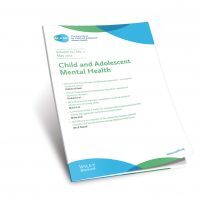Researcher / Academic
-

Supporting Families of Trans Youth: A New Toolkit Rooted in Lived Experience
A new community-based participatory study highlights the importance of family support in improving mental health outcomes for transgender and nonbinary youth. Co-created digital stories reveal how open communication, shared reflection, and inclusive family involvement can reduce isolation, foster empathy, and build stronger connections. The result is a flexible toolkit designed for both professionals and caregivers.
Read more -

Validation of a Mobile App for Remote Autism Screening in Toddlers
A 2025 multi-site study led by Dawson and colleagues evaluated a mobile app called “SenseToKnow,” designed for accessible, early autism screening in toddlers. The results suggest digital approaches as a promising way to make early identification more accessible, objective, and equitable for all families.
Read more -

Blades and Wounded Minds: exploring the links between youth mental health and knife crime
This webinar examines the complex relationship between youth mental health issues—particularly trauma and anxiety—and the rise in knife crime among young people.
- Event type
- Half day conference
- Location
- LIVE STREAM
-

Putting Sustainability at the Front of Digital Mental Health
Research has indicated the urgent importance of embedding sustainable practice into research and healthcare. With the rapid deployment of AI and other novel technologies across healthcare, we must consider sustainability in the research and development of digital mental health technologies. Here, two mental health researchers reflect on their work in digital mental health and what is next for sustainable mental health research.
Read more -

ACAMH Awards 2025 Longlist – Recognising Advancements in CAMH Research and Practice
It is our pleasure to announce the long list of nominees for the 2025 ACAMH Awards. Congratulations to all nominees for making it on the longlist.
Read more -

Operationalizing the ICF Core Sets for Autism and ADHD: From Framework to Feasible Tool
Alehagen, Bölte, and colleagues conducted a feasibility study to develop and user-test an online platform for the ICF Core Sets for autism and ADHD. The study found that the platform was easy to use, acceptable to participants, and capable of capturing the diversity of functioning profiles, with iterative revisions addressing user feedback. The tool is now ready for psychometric validation.
Read more -

Autumn Webinar programme
Don’t miss the early birds! All events are centred around evidence-based research, and our speakers are some of the leading lights in the field. ACAMH is a charity, and we receive no government funding, nor do we ask for donations.
Read more -

From Isolation to Intervention: Loneliness and Youth Mental Health
This Loneliness Awareness Week, please explore the FREE learning opportunities available on our website and ACAMH Learn and do share with your networks.
Read more -

CAMH 2025 Special Issue – ‘Physical Environmental Influences on the Psychosocial Outcomes of Children, Adolescents, and Young Adults’
The Child and Adolescent Mental Health (CAMH) Journal are delighted to announce the CAMH 2025 Special Issue on ‘Physical Environmental Influences on the Psychosocial Outcomes of Children, Adolescents, and Young Adults’, edited by Keri Ka-Yee Wong, Efstathios Papachristou, Marta Francesconi, and Tycho J. Dekkers.
Read more -

STEPS in the Community: Pilot Trial Offers Promising Pathways for Autistic Adults Transitioning to Independence
Up to 70,000 autistic teenagers enter adulthood in the US each year, yet many report feeling unprepared for the leap. The Stepped Transition to Employment and Postsecondary Success (STEPS) programme is a goal-oriented intervention designed to bridge this gap.
Read more